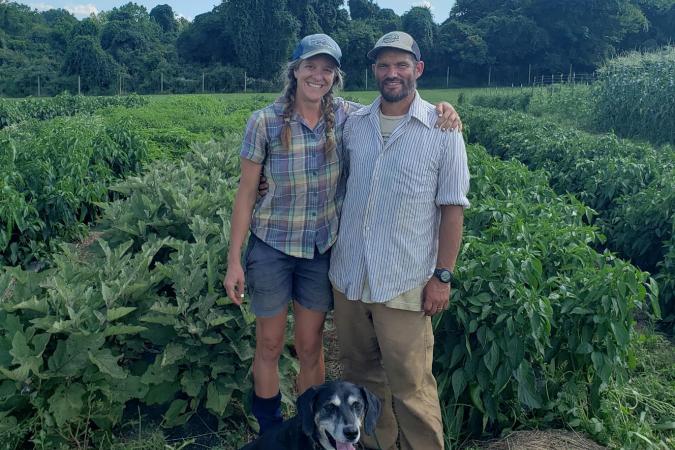Meet the Farmers
Stacey Carlberg and Casey Gustowarow have been farming side-by-side for 15 years. In that time they have worked on—and managed—two large diversified vegetable operations: Potomac Vegetable Farms in Purcellville, Virginia and The Farm at Sunnyside in Washington, Virginia. The two farmers have earned a reputation for producing incredible vegetables—but particularly hot peppers, tomatoes, and radicchio, and a wide variety of herbs—with incredible colors, flavor, and nutrient-density.
In 2021, Stacey and Casey decided to launch their own farm and food business: Fireside Farm—a diversified vegetable farm that's focused on improving soil health, rebuilding community, and growing delicious, nutritious, flavorful food. The produce grown at Fireside has become a favorite with locals, at the regional farmers’ markets, and at the DC restaurants they service. And, their community pizza nights have become a popular celebration and reaffirmation of the importance of farming, food, and flavor.
Regenerative & Sustainable Management
Both Casey and Stacey have a record of drastically improving the soil health at each farm they’ve tended. They are known for transforming neglected fields into productive, healthy spaces. Some of the practices they employ are:
Strictly organic growing practices (although not certified organic)
Cover Cropping
Crop Rotation
Mulching
Minimal tillage, w/ sections of the farm dedicated to no-till, when appropriate
Maintaining a diverse mix of vegetables, fruits, herbs, cover crop, native and perennial plants are grown on-site, indicating rich plant biodiversity
Biologically-active compost production occurs on-site, along with on-site straw production
Heavy mulching of straw in and around vegetable beds lends to an increase in organic matter and minimal plastic use (using organic matter as a mulch as opposed to plastic mulching)
Beds are either in cash crop, cover crop (diverse species), or mulched. No beds are left fallow to prevent risk of erosion and run-off into local waterways and the loss of topsoil.
Edges of the farm are not heavily mowed, resulting in habitat creation for pollinators, birds, and other animals.


